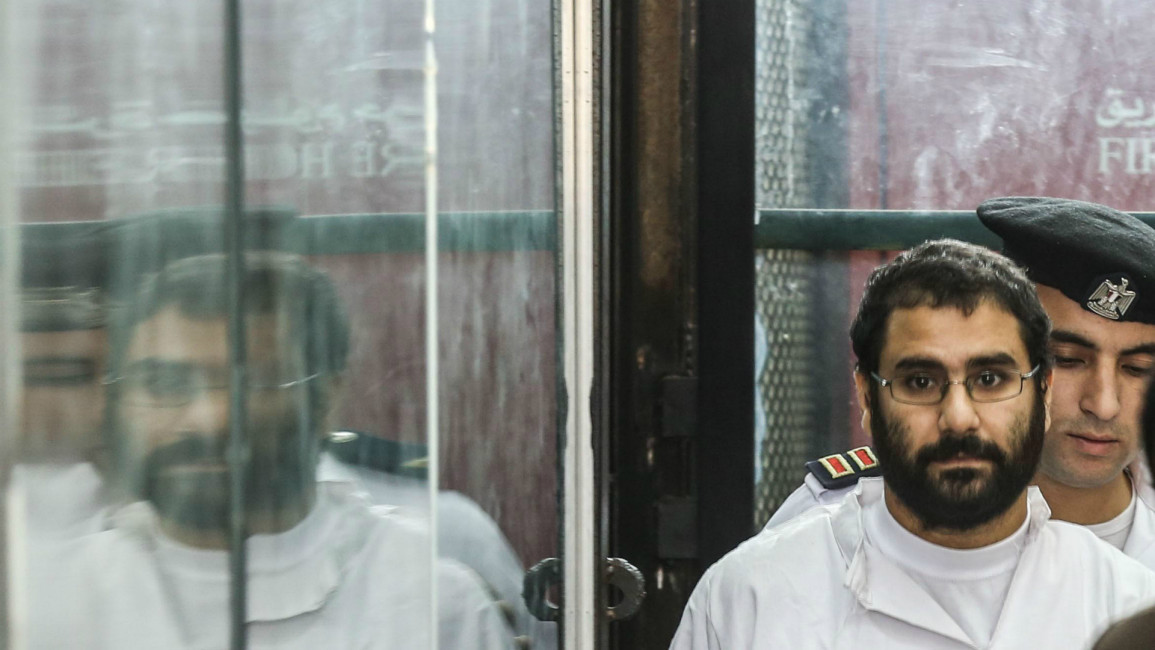Egyptian activist Abdel-Fattah jailed for 5 years
An Egyptian court sentenced one of the icons of the country's 2011 uprising to five years in prison Monday, showing authorities' determination to continue to stifle dissent despite promises by its president to release "wrongly jailed youths."
The verdict came in the retrial of well-known activist Alaa Abdel-Fattah, who earlier received a 15-year prison sentence for organising an unauthorised protest and allegedly assaulting a police officer.
The courtroom erupted after the verdict, with those in the gallery shouting: "Down with oppression!" One man collapsed as Abdel-Fattah's family and friends wept and screamed: "Down with military rule!" Police ultimately ordered everyone to clear the courtroom.
Defence lawyer Mohammed Abdel-Aziz decried the verdict as "harsh and oppressive."
The court "didn't take into consideration any of the evidence that showed the defendants' innocence," he said.
Another rights lawyer on hand, Taher Abou el-Nasr, said "Regrettably, the verdict was expected. We no longer expect acquittal."
| The courtroom erupted after the verdict, with those in the gallery shouting: "Down with oppression!" |
Lawyers said they will appeal the ruling to Egypt's Court of Cassation, the country's highest appeals court.
An outspoken blogger, Abdel-Fattah has been in and out of prison in the years since the 2011 ouster of autocrat Hosni Mubarak. He campaigned against military trials for civilians during the 17 months that generals held power following Mubarak's resignation. He also opposed Islamist President Mohammed Morsi, whom the military overthrew in 2013.
The charges against him stem largely from a law prohibiting protests in Egypt without prior government permission, a measure that came after Morsi's overthrow. Activists and rights groups have criticised the law as a way to stifle all dissent.
Abdel-Fattah was accused of inciting an "unauthorised" demonstration on 26 November 2013, against a clause allowing military trials for civilians in the draft of a new constitution, which was later adopted by referendum.
Mona Seif, Abdel-Fattah's sister and one of the organisers of the protest, said her brother attended the demonstration but denied he had organised it, saying it was called for by a group that campaigns against military trials for civilians.
Police violently dispersed the demonstration on the grounds that organisers had no permit. Women protesting, including Seif, were detained by police and later dumped in the middle of the desert outside of Cairo that night.
Abdel-Fattah previously said his trial, which includes 19 other defendants and five people being tried in absentia, was a farce. He has been on a hunger strike.
A robbery charge Abdel-Fattah faced was dropped. Ahmed Abdel-Rahman, another defendant on trial with him, received a five-year sentence as well, as the others charged received three-year sentences.
The ruling comes a day after Egyptian President Abdel-Fattah el-Sissi promised to release youths wrongly arrested. He said that the coming few days will witness first group of youth released from detention.
The new measure is not expected to affect those on trial like Abdel-Fattah. However, some hope authorities will resolve the standoff between them and youth activists who were rounded up and locked in detention centers for marching in demonstrations against the government.
Rights group say that there are more than 20,000 people behind bars now in Egypt, most of them Islamists.



